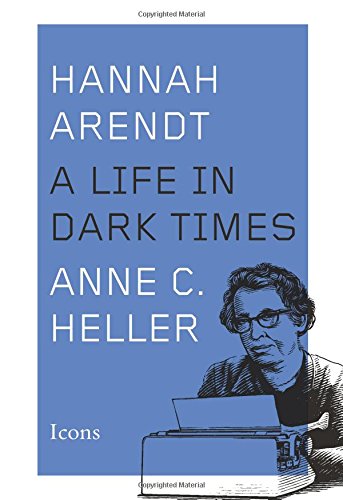Books |
Hannah Arendt: A Life in Dark Times
Anne C. Heller
By
Published: Sep 01, 2015
Category:
Biography
We all know one fact about Hannah Arendt: In her book about Adolf Eichmann, the Nazi SS officer who helped to carry out Hitler’s “Final Solution,” she used the phrase “the banality of evil.”
Some of us know what happened next: a firestorm of criticism from those who interpreted that phrase to mean that Arendt believed Eichmann’s claim he was just carrying out orders as a cog in the Nazi death machine.
Less well known: a second shock wave over Arendt’s claim that Jews made the Holocaust more deadly by cooperating with the Germans.
But the Eichmann episode turns out to be only a small slice in a life rich in controversy and drama. I thought I had a general idea of Arendt’s thought and life. Ann C. Heller’s immensely readable 132-page biography showed me how little I knew — this is a book of ideas, but it’s also about a series of great romances. [To buy the book from Amazon, click here. For the Kindle edition, click here.]
Arendt was born in Prussia in 1906, an only child. Before her parents’ marriage, her father had contracted syphilis; by 1909, he was on the downhill slope. Her family’s fortunes followed, and she was lucky that money was found to send her to university in Marburg.
Arendt was beautiful and brilliant, and Martin Heidegger, then teaching philosophy there, had only to see her to want her. That he was 35 years old and married was no impediment. Nor was the fact that Arendt was a Jew and he was an anti-Semite. She became his first mistress, his secret mistress. For three years.
Heidegger and Arendt parted in 1926. By 1930, Arendt knew something many didn’t: “The Nazis were our enemies, and a large number of the German people were behind them.” With that realization, she raised her voice. As Heller writes, “Having decided not to become an intellectual, Arendt became an outlaw.”
Arrested in 1933, she fled Germany. Worked with a Zionist resettlement agency. Fled to New York, $25 in her pocket. Learned English and began to write for the leading intellectual magazines.
Her explorations are riveting. Rich Jews like the Rothschilds shone brighter as the Nazis degraded poor Jews, but in the end, even the “privileged Jews” were just Jews to the Nazis. German unemployment had made millions feel unheard and undesirable and eager for a scapegoat. Israel could not succeed as a Jewish state. And, from personal experience, she translated her knowledge of The Outcast into something larger and more frightening.
When he is 60 and she is 44, long after the war ended, Arendt met Heidegger again. What passed between them is profound and worth the price of the book.
Arendt was wrong about Eichmann. After the trial, documents and tapes were found that revealed his active hatred of Jews: “I worked relentlessly to kindle the fire. I was not just a recipient of orders. Had I been that, I would have been an imbecile. I was an idealist.” And, at his trial, a liar, desperate to save his life. But Arendt could not have known this.
“Things looked different after Hannah looked at them,” a friend said. Eichmann was just one example — what she wrote framed a global conversation.
EXCERPT: Click here.
MOVIE PREVIEW


